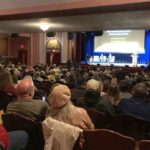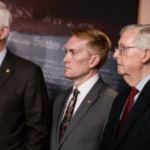Energy News Beat
An anonymously funded group is spreading misinformation about a rural Ohio solar project, according to project backers and others who reviewed claims made at a recent event.
Knox Smart Development was incorporated last month by Jared Yost, a Mount Vernon resident and opponent of the planned 120 megawatt Frasier Solar project. Three weeks later, on Nov. 30, the group hosted a catered “town hall meeting” at a Mount Vernon theater that included speakers with ties to fossil fuel and climate denial groups.
A company official with the solar developer, Open Road Renewables, was denied entry to the event, which was attended by approximately 500 people and featured complimentary food and drinks following the program.
It’s unclear who funded Knox Smart Development so it could pay for the event.
“There are people with concerns who are helping us, and they’ve all asked to remain anonymous,” Yost said when asked about its funding sources as people left the theater. “So we have local concerned citizens who are helping to fund this, including myself.”
Get connected
Every morning, thousands of energy professionals turn to our newsletters for the day’s most important news. Sign up for free to get the latest delivered straight to your inbox.
A Dec. 7 filing advised developer Open Road Renewables and others that the Ohio Power Siting Board was ready to start review of the application for the Frasier Solar Project, which was filed in October. The project would be located in Clinton and Miller townships, both in Knox County. Yost and Knox Smart Development filed to participate in the case as parties on Dec. 8.
An early version of Knox Smart Development’s website included the text, “Our mission: Empowering America,” with a hyperlink to a page for an organization called The Empowerment Alliance. Research by the Energy and Policy Institute, an energy and utility watchdog group, has linked the Empowerment Alliance to the natural gas industry.
Dave Anderson, the institute’s policy and communications director, found a National Review Ideas Summit program guide that characterized The Empowerment Alliance as a project of Karen Buchwald Wright and her husband, Tom Rastin. Wright is the board chair of Ariel Corporation, which makes compressors for the natural gas industry. Its headquarters is in Mount Vernon.
The Empowerment Alliance’s highest paid contractor for the past four years, according to Internal Revenue Service filings, has been a group called Majority Strategies. Its chief strategist, Tom Whatman, emceed the Nov. 30 event for Knox Smart Development. Whatman is also the former executive director of the Ohio Republican Party.
Another speaker at the Nov. 30 event, Mitch Given, has appeared on behalf of The Empowerment Alliance to promote natural gas issues to county commissioners in Ashland, Madison and Logan counties. In Ashland County, Given said the alliance takes a hard line against renewables, and that Rastin, a director of Ariel Corporation, has been a major supporter.
Whatman introduced Given at the program as someone who has been traveling around the state talking to farmers and others “that don’t know where to turn to find their voice to help them organize and how to push back” against solar projects.
Steve Goreham, a featured policy expert on the website for the Heartland Institute, also spoke at the Nov. 30 event. Heartland is well known for its attacks on mainstream climate science, and Goreham has often argued against the scientific consensus that human-caused climate change is real and driven primarily by emissions from burning fossil fuels.
Separate from the meeting, various area residents received free copies of Goreham’s latest book, which claims there will be a coming renewable energy failure.
“Given the significant misinformation surrounding solar and wind arrays, I bought you this book that really lays out the facts,” said an enclosed note signed by Wright as Ariel’s chair.
Goreham is an “old-school climate change denier,” said Deborah Kennard, a professor of environmental science and technology at Colorado Mesa University, who has heard him speak before. Stated premises may be factual. But the framing or omission of other facts can lead people to questionable conclusions.
During the Nov. 30 talk, for example, Goreham noted that California and Texas produce lots of renewable energy, yet their electricity prices have risen. In California, though, wildfire mitigation and electric grid upgrades have been big factors behind rate increases. And this summer’s heat wave drove high prices in Texas, where natural gas provides more than 40% of the electricity.
Goreham also cited Texas’s deadly power outages in February 2021 to support his view that renewables are unreliable. Although all types of power generation had problems due to a winter storm then, more than half of the state’s natural gas production was shut down at one point.
Another speaker featured via video recording at the Nov. 30 meeting, Brown County Soil and Water Conservation board member and beef farm operator Aubrey Bolender, raised concerns about taking farmland out of production and complained about topsoil being trucked away from a Brown County project — a claim the developer has said is not true.
Craig Adair, vice president of development for Open Road Renewables, could have addressed the claim but was denied entry to the event despite registering and having a ticket. The company has released an explainer, which it says debunks the worst assertions made at the Knox Smart Development program.
“They cynically claimed the event was intended to educate the public about Frasier and utility-scale solar energy, when it fact it was merely a well-funded propaganda event during which political operatives took the stage to make false claims and spread misinformation about solar energy and my company,” Adair said.
Among other things, he said, topsoil will remain on site. The company takes flooding complaints seriously and has responded to concerns at the other project site, he added. Plans for the Frasier Solar project envision its permit would also require protection and maintenance of drainage tiles.
“We want to be sure things are done right on the front end,” Adair said.
The project has supporters in Knox County, too.
Kathy Gamble is an area resident who started Knox County for Responsible Solar to support a neighbor and others who want to see solar projects in the area. The group is independent of Open Road Renewables, she said, adding that funding for signs and other expenses has come mainly from her and other residents.
“What I feel bad about is all the misinformation that’s put out there,” Gamble said. Among other things, she challenged fear-mongering about solar projects taking farmland out of use. “We’re not going to starve to death.” She worries about property rights as well.
Ashley Labaki, IBEW Local 1105’s business development liaison, thought it was a “laughable excuse” for speakers at the Nov. 30 program to downplay the project’s potential economic benefits by saying there would be few permanent jobs.
“All construction jobs are temporary,” she said, noting her husband is a union member and has been working on a solar project near New Albany. “These are things that are currently paying my house payment, my water bill and things like that.”
Under Ohio law, solar projects must have at least 70% in-state workers to qualify for payments in lieu of taxes, compared to just 50% for other energy projects.
Disinformation has real victims, stressed Anderson. “Landowners and farmers who choose to lease out some land and host solar panels are being unfairly villainized and attacked, and will lose out on a new source of income they may be counting on,” he said.
The Ohio Power Siting Board could decide next year whether the Frasier Solar project gets built.
Related
The post Anonymously funded group stokes local opposition to Ohio solar project appeared first on Energy News Beat.








